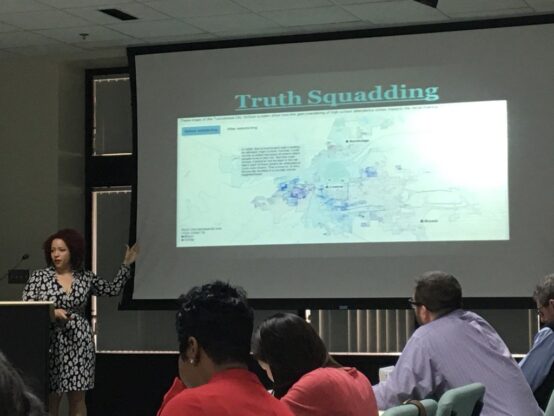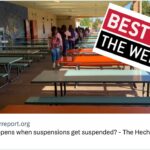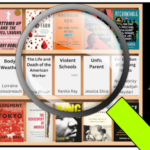At a recent Poynter event, Nikole Hannah-Jones explained why she thinks white reporters – especially those who are parents – struggle to cover school segregation adequately.
By Alexander Russo
Nikole Hannah-Jones has done a lot for education journalism over the past two or three years.
She’s brought prominence and star power to the beat. I wouldn’t have been surprised to have seen her at an awards show this winter, though she seems far too busy giving talks and presentations all around the country.
She’s helped focus an enormous amount of attention on the fundamental issues of racial segregation and inequality in American schools. Last summer, she wrote about why she chose a segregated school for her daughter rather than some of the more diverse alternatives. More recently, she wrote about how the uproar over Trump’s Education Secretary Betsy DeVos was obscuring larger truths about white abandonment of an integrated public system of schools.
And she’s been an inspiration and model for many education journalists who name her as their favorite. They crowd around her at conferences like she’s a Broadway star – as they should. It’s an exciting time.
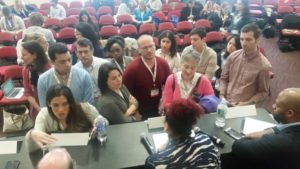
Education reporters waiting to talk to Hannah-Jones at last year’s Education Writers Association conference.
To her credit, the adulation Hannah-Jones receives from other reporters hasn’t blunted her willingness to talk candidly about both the need for dramatic changes in public education and for substantial improvements in education journalism.
That is, she’s willing to criticize her admirers.
At events like last month’s Poynter Institute-Education Writers Association mini-conference, for example, Hannah-Jones seemed to enjoy the attention of a roomful of education reporters and also to have stepped up her challenge to those of us who produce education journalism.
To put it bluntly, Hannah-Jones remains unsatisfied with the coverage of deep and long-established racial segregation in American schools, despite recent reporting efforts. (Just this month, the Hartford Courant and Baltimore Sun produced multipart stories.)
And she thinks she’s identified some of the many reasons why journalists shy away from reporting and writing about race in education – including our own complicity in a racist education system, both as students and as parents.
The talk was not recorded, and the full set of slides is not available, but the highlights from her talk have been recreated from notes and social media, and a draft of the column was shown to Hannah-Jones to make sure there were no factual errors.
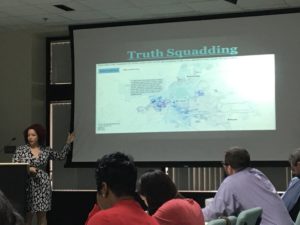
Hannah-Jones talking about school segregation at last month’s Poynter-EWA mini-conference in Tampa, FL.
Many elements of the Hannah-Jones talk will be familiar to those who have heard her speak before:
At the Poynter event in February, funded by the Annie E. Casey, Lumina and Ford foundations, Hannah-Jones reminded journalists that their role is unique and important: “There are children who are not getting the education we promised them. We [journalists] are [sometimes] their only voice.”
As in the past, she focused on school integration as the key to improving public education: “Integration is about justice,” she says. Segregated schools often trap kids in a segregated life, cut off from access to opportunity a more integrated experience would afford.
And she reminded everyone that school segregation is neither just a Southern problem nor accidental — and integration won’t be, either: “Where school integration has happened, it has been forced, not because it’s something most white Americans wanted.”
Finally, she highlighted the cumulative effect of individual parent decisions, which cumulatively shape the demographic distribution of school system. Are parents moving to a neighborhood where they will be in the demographic majority, exacerbating residential segregation? Are they choosing a private school or magnet and bypassing a neighborhood school where their child would be in the minority?
“Every time a parent makes a decision for justice, it makes it harder for other parents not to.”
__
In focusing on individual parent decisions, Hannah-Jones is rejecting the commonly expressed view that parents are only required to do what’s best for their own kids when it comes to school choices for their children. A focus on the common good is not thought to be required in this area.
And it turns out that Hannah-Jones has unconventional thoughts about the obligations of journalists who have children, too.
Hannah-Jones’ focus on how segregation gets covered – or not – has grown more emphatic and pointed recently, even though she couches her comments in gentle “we” language:
“We get really weird when it comes to reporting about race,” she said to the assembled education reporters. Basic reporting goes out the window. “We get real squirmy.”
The reason, she thinks, is partly that it’s hard to call someone a racist, and even harder to prove. Reporters think “I have to have an email that says ‘We’re doing this because we hate black kids,’” according to Hannah-Jones.
But that kind of evidence rarely exists, and isn’t necessary. What reporters need are outcomes that show black and brown kids are being treated differently from white ones.
“I don’t care what’s in someone’s heart,” Hannah-Jones said. “It’s not about animus.”
Even more so, reporters’ fear gets in the way of calling racism out, according to the Times Magazine reporter. “It’s our own visceral fear of being called racist ourselves” that hinders reporting on segregation and race, said Hannah-Jones.
We’re afraid to challenge decisions that perpetuate segregation because maybe we understand them. “Do we really think that black kids are as smart as white kids?” asked Hannah-Jones. “We say we believe, but I don’t know that that’s true.”
Indeed, most white journalists went to high-functioning schools, according to Hannah-Jones. They may have been segregated, but they worked well enough for the white journalists who attended them. And so white reporters’ knowledge of black and brown kids doing just as well in school as white kids may be something abstract or intellectual or even philosophical, rather than grounded in real-life childhood experiences.
But the biggest obstacle to journalists covering segregation consistently and effectively, according to Hannah-Jones, is that we journalists are implicated in the social injustice that we’re supposed to be covering. Highlighting race-based discrepancies in education raises the possibility of having our own racial blind spots exposed. We might be implicated. We might be hypocritical.
And white education reporters who are also parents are at a special disadvantage in covering segregation, according to Hannah-Jones. These journalists have had to figure out how to access the best possible education for their own children while trying to report about what is often a wildly inequitable system.
These journalists have had to participate in as well as observe — often at the same time. It’s no easy feat.
Asked about Hannah-Jones’ observations, at least one education reporter generally agreed.
“It’s uncomfortable to write a story exposing a system of privilege from which you benefit,” said the Tampa Bay Times’ Cara Fitzpatrick, one of the lead reporters on Failure Factories.
Asked for an example, she cites early resistance from editors over a story of hers about “fundamental” schools intended to help integrate the school system that had become something of an enclave for white professional families. “A lot of editors had sent their own children to [these] schools.”
Others may disagree, observing that being a parent helps them understand the system better.

That awkward moment when white journalists realize that the good schools they went to and are sending their kids to are racially segregated and wildly better-resourced than schools many black and brown kids have to send their kids to.
So how can we address these possible obstacles to more, better reporting on school segregation?
Certainly, listening to reporters like Hanna-Jones is a start.
“I don’t expect that my writing is going to bring about massive change,” said Hannah-Jones.“But I’m not going to allow us to ignore what’s happening.”
Bringing more people of color into journalism and onto the education beat would help.
Toward that end, Hannah-Jones has helped launch the Ida B. Wells Society for Investigative Reporting, a training and mentorship organization to help increase the number of investigative journalists of color.*
There’s also a Center for Investigative Reporting Diversity Fellowship program, run by Martin Reynolds and funded by the Kellogg Foundation. (Of more than 140 applications last year, roughly 20 were education-related, according to Reynolds. One of the winners, Sierra Manie, is a Hechinger Report writer.)
Then there’s the EWA Reporting Fellowship, whose first recipients included Erica Green (now of the New York Times). Current recipients include Jamaal Abdul-Alim and Tara Garcia Mathewson.
Another approach is to engage and support education journalists who are interested in school integration and willing to confront their own blind spots and prejudices.
One possible vehicle for some of that work is a new reporting and community engagement consortium that the Center for Collaborative Journalism and Reveal Labs (from the Center for Investigative Reporting) have been forming, called the School Colors Project. They held a meeting earlier this month in Macon, Georgia.
Newsrooms might try pairing journalists from different backgrounds together to report on school issues. Both Liz Bowie and Erica Green noted in recent interviews that their collaboration for the Baltimore Sun’s series was enormously helpful in terms of improving the work they produced.
Producing more, better coverage of school segregation is one of the biggest and most immediate challenges facing the beat, and we should be bringing to it all the urgency and tolerance for discomfort we can muster.
“We must not let this attention be a fad,” tweeted Hannah-Jones after the event.
*Correction: The original version of this piece referred to the Ida B. Wells Journalism Fellowship, rather than the Ida B. Wells Society.
ABOUT THE AUTHOR

Alexander Russo
Alexander Russo is founder and editor of The Grade, an award-winning effort to help improve media coverage of education issues. He’s also a Spencer Education Journalism Fellowship winner and a book author. You can reach him at @alexanderrusso.
Visit their website at: https://the-grade.org/

